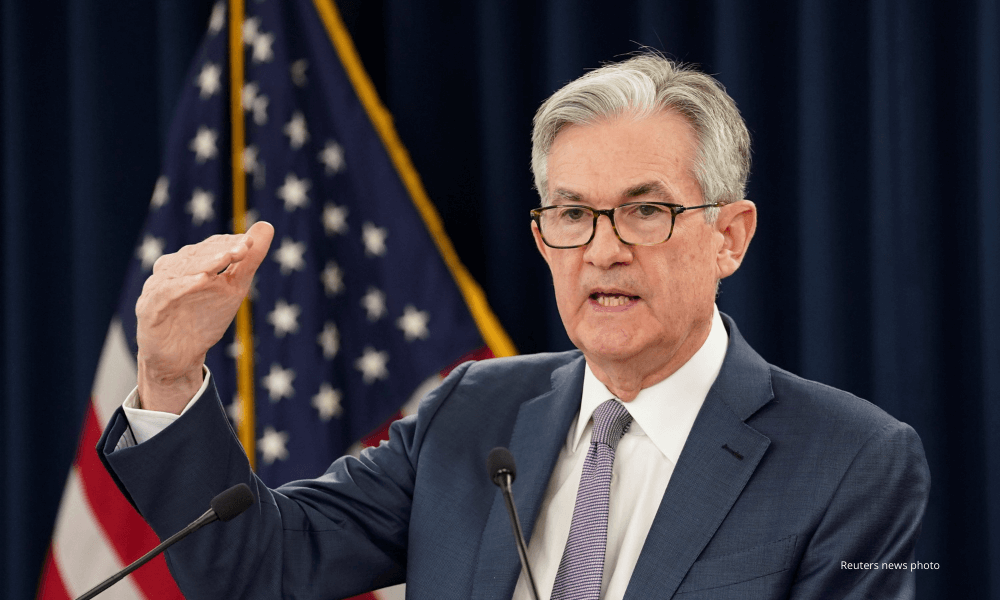
Reuters, 11 January - In a congressional hearing that pointed to his likely confirmation for a second term as head of the U.S. central bank, Federal Reserve Chair Jerome Powell said on Tuesday that the economy should weather the current COVID-19 surge with only "short-term" effects and that the economy was ready to begin tightening monetary policy.
Powell received open support from Republicans and Democrats on the Senate Banking Committee during a hearing that focused on how the Fed planned to address multi-decade high inflation, why the central bank misdiagnosed the surge in price increases, and what stricter monetary policy would mean for job growth.
The Fed chairman stated that the central bank was committed to ensuring that high inflation would not become "entrenched," and that a shift to higher policy interest rates and runoff of its asset holdings, rather than slowing employment growth, was required to keep the present economic upswing going.
If prices continue to climb, the Fed may be pushed to raise interest rates faster this year than the three quarter-percentage-point hikes now anticipated by policymakers, risking a return to recession.
"The rate of inflation is well over the target. The economy no longer requires or desires the extremely accommodating policies that we have in place "In his testimony, Powell added.
With the Fed's benchmark overnight interest rate approaching zero and roughly $9 trillion in assets on its books, Powell warned: "it's a long road" to anything resembling restraint. Meanwhile, he stressed that the Fed's policies "should not negatively impact the labor market."
"You must concentrate on bringing inflation under control since maximum employment cannot be achieved without price stability."
It’s a LITTLE NIMBLE
The hearing had the potential to turn sour. Some Democrats have expressed opposition to Powell's re-nomination and criticized his oversight of Wall Street a stock trading scandal and the resignation of several top officials have tarnished the Fed's reputation, and some Republicans have argued that he is allowing the central bank to become partisan on issues such as climate change and economic inequality.
However, it was generally reserved and focused on fundamental economic issues. Powell made his most explicit remarks on how the unexpected surge in coronavirus infections impacted his view.
Despite the delays to education, travel, and even some essential services, "what we are seeing is a positive trend."
While the number of price rises forced the Fed to act, Powell believes that some relief will come from sources other than monetary policy as global supply chains begin to catch up with demand.
Powell said the Fed made the mistake of expecting that adjustment to happen quickly, which is why it initially rejected increasing inflation last year as unlikely to fade without a Fed response, only to see prices continue to rise to levels not seen since the 1970s and 1980s inflation scares.
He said he now expects inflation to moderate by the middle of the year, but the Fed is prepared to raise borrowing costs if necessary to ensure that this happens.
"We'll have to be modest, but not too modest." Powell gave no new clues about when interest rates will rise, which many analysts predict will happen in March.
He also stated that no decision had been taken on when the Fed's asset holdings would begin to fall, but that it would happen "sooner and faster" than it did following the 2007-2009 recession when the Fed waited approximately two years after an initial rate hike to do so.
During Powell's testimony, U.S. markets rebounded after starting the year on a sour note as the Omicron variation fueled a surge in COVID-19 cases. Investors adjusted for a Fed more bent on managing inflation.
Short-term Treasury yields have fallen from pandemic-era highs recorded earlier this year.
RATES ARE GOING UP
Powell is anticipated to be confirmed to a new four-year term, and the hearing was the first stage in that process. On Thursday, the same panel will question Lael Brainard, who is now a Fed governor, for promotion to a four-year term as Fed vice-chair.
Senators Sherrod Brown, a Democrat, and Pat Toomey, a Republican, both backed Powell's handling of the Fed's response to the outbreak at the start of Tuesday's session, even as they voiced reservations about the Fed's future measures.
"I believe you've demonstrated leadership" in leading the Fed through arguments over inflation, regulation, and an ethics controversy involving senior officials' stock trading, Brown said.
Toomey expressed concern that the Fed's aggressive response to the epidemic is now fueling inflation and "may become the new normal," and reiterated his disapproval of the central bank's involvement in what he sees as political concerns such as climate change and inequality.
The Fed announced in December that it would stop buying Treasuries and mortgage-backed securities by March, as part of its nearly two-year fight against the pandemic's economic consequences, and that it could hike interest rates three times this year.
The financial markets are pricing in four rate hikes this year, which is a slightly faster pace than last year.